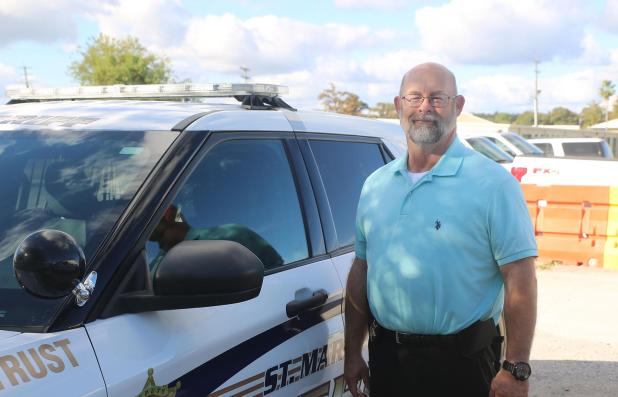
Chief Deputy Gary Driskell received 77% of the vote for sheriff in the Oct. 14 primary.
The Review/Bill Decker
Sheriff-elect hopes to tighten bond with community
When Gary Driskell looks at the future of the St. Mary Parish Sheriff’s Office, he sees deputies more closely connected with their communities, from playing kickball with school kids to offering protection and reassurance to residents who won’t sit on their porches at night for fear of gunfire.
“We’re trying to find new and better ways to interact with the public,” Driskell said in an interview Tuesday.
Driskell, currently the Sheriff’s Office chief deputy, will become sheriff in January. After incumbent Sheriff Blaise Smith announced that he wouldn’t seek re-election, Driskell won 77% of the vote for an outright win in a four-candidate field in the Oct. 14 primary.
Now he wants to use community policing to tighten the bond between deputy and community, calling on lessons he learned as a patrolman in the parish where he grew up.
Driskell was born and raised in Morgan City. After graduating from Morgan City High, he enlisted in the Army in 1986 and served as a military policeman. He left the full-time service in 1989 but was still a reservist when he was called back to active duty for the first Gulf War.
Driskell was sent to Fort Polk for training in anticipation of being deployed to Saudi Arabia. Instead, he was stationed in Germany.
When Driskell returned home, his father lined up a security job for him. But that wasn’t the work he wanted to do. So, in December 1990, Driskell was hired as a corrections deputy by then-Sheriff Huey Bourgeois.
Driskell went on to serve in the patrol, narcotics, detective and administration divisions, eventually becoming a supervisor in each of them.
Along the way, he learned the value of community involvement.
“As a young deputy, I’d stop and talk to people …,” Driskell said. “You end up getting a rapport with people. And I solved a lot of cases with information I got from people.”
Driskell’s duties as chief deputy have increased as Smith has suffered from health problems at the end of this term.
The office meets regularly with representatives of municipal departments, and Driskell believes he works well together. One example is the assignment of deputies to help Franklin deal with an outbreak of gun violence. Deputies confiscated 86 weapons in the course of a few months.
New Franklin Police Chief Cedric Handy reported that after two months in which six shootings were reported, the numbers flipped to two shootings in six months.
Driskell believes he has been able to make some moves that improved the Sheriff’s Office budget outlook. In the most recent budget, revenue exceeds spending by $1.3 million.
The office, which until recently had to buy used Louisiana State Police vehicles for its fleet, has been able to buy 36 new vehicles in recent months. He’s working on the purchase of dash cameras for Sheriff’s Office units to supplement body cameras already in use.
One challenge facing the department is staffing. Like other police agencies, and other public-sector entities, the Sheriff’s Office has had to scramble for good applicants.
Sheriff’s offices in Louisiana are also hampered by rules against political feather-bedding. Their staffs are limited to the average number of employees for a year leading up to an election and six months afterward, a move to prevent sheriffs from hiring deputies for little more than campaigning for the incumbent.
But Driskell said educational incentives for deputies have helped. Deputies can receive $750 per semester in tuition assistance if they keep their grades up.
The Sheriff’s Office is now attracting good candidates, he said, including Peace Officer Standards Training-certified applicants.
The 142 employees of the Sheriff’s Office taught Driskell another lesson. After the budget situation improved, he asked deputies what they would like to see the office buy. The answer was jacks.
They told Driskell that because they’re being called on to help stranded drivers, including those with flat tires, they’d like something better than the time-consuming space-saver jacks that come with many cars nowadays.
So the office bought 30 jacks.
Fixing flats is another example of how deputies can strengthen the connection that’s at the heart of community policing.
And nowhere is the attempt to improve that bond more evident than in schools.
Some of the law enforcement interaction with schools involves preparation for the worst possible case: an active shooter. Deputies and local police hold regular exercises to sharpen their response.
Lessons have been learned there, too, Driskell said.
The standard response to a standoff with an armed suspect has been to set up a perimeter and wait the situation out. But recent school shootings have shown that waiting can lead to the deaths of children and staff members.
“Personally,” Driskell said, “I’m not going to wait.”
Other aspects of the law enforcement-school relationship are more benign.
The Sheriff’s Office is working with municipal police departments and the St. Mary Parish School Board to put more resource officers on campuses. Municipal departments now have five resource officers, and the Sheriff’s Office has increased the number of its resources officers by one to three.
Deputies have begun going from school to school for basketball games with students.
“We want kids to know that if something’s wrong, they can come to us,” Driskell said.
